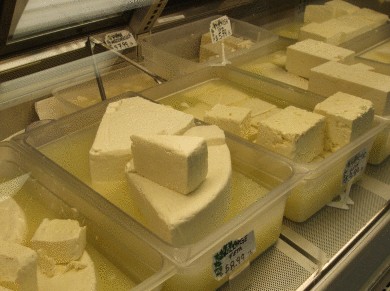
The power of cheese
Like all immigrants,
The Power of Cheese
Posted on July 10th, 2012
The power of cheese
Like all immigrants, Arab Americans in tough times seek comfort and refuge in the warmth of their ethnic foods. As their nomadic ancestors did in the desert for hundreds of years before them, they carry their food wherever they go to sustain them in an in hostile terrain. The sizzle of frying falafel. The rich aroma of shaworma. The smooth flavor of BABA GHANNOU and Hummus, the beauty of artfully displayed meza and the heavy sweetness of Baklava — all take us back to the comfort and security of our home. But no other Middle Eastern food so reflects our ethnicity and identity as cheese.
We have as many different kinds of cheese as nationalities: Egyptian, Istanboli, Greek, Lebanese, Moroccan and Palestinian. So if you want to measure the Arab American melting pot in the United States, don’t look at Arab American Mosques or hijab fashion index, instead look at the feta index, look at Arab Americans consumption ratio of feta cheese to the consumption of American cheese.
Americans seem to treat cheese as dead food that is wrapped in plastic bags and kept in the refrigerator like corpses, while Arabs like to treat cheese like fresh meat that should be cut before your eyes and kept in the open. Buying cheese is an art in itself, you have to use more than one sense in picking up a good cheese, first the color has to be bright white, no funny smells, firm texture. You never know how long it has been, or how it was made. I find it very hard to buy cheese in American supermarkets. You cant get personal with American cheese, always distant like a Muslim woman fully covered with a plastic burka, disdain touches and pokes, and you can’t sample it before you buy. Second generation Arab American children; however, lose this reverence right after their first trip to MacDonald’s restaurant and experience the taste of the melted cheese in their happy meal. Egyptians don’t throw their cheese away; for them, there is really no such thing as expiration date. When it gets old, they just give it another name. Cheese starts with a name like Areesh, when it gets mushy it is Creamy, then Brameely, and when you can’t stand its rotten smell, it is Mish. They say that there are more people in Egypt who die from eating feta than gun shots, but that was before the Military took over of course.
Breakfast is a culture specific meal, feta is the crown jowl of our breakfast other meals, you can easily enjoy other ethnic food; Chinese, Italian or Indian, but when it comes to breakfast, you want to have your own food, Arab breakfast, unlike the American counterpart, is a peaceful meal, no animal needed to be killed, no chicken eggs to be cracked, no fat and no cholesterol either; every mooring you start your day with a comfort less stressful food.

So living in the US, every morning I always prepared my breakfast trio; feta cheese, tomato, and black olives. My daughter at first enjoyed eating feta as much as listening to stories of my Egyptian boyhood. This changed when she became a teen and I had to quietly sneak feta into her breakfast sandwich under the cover of mayonnaise. I understand her feelings. When I was a youngster growing up in an Egyptian village in the Sixties, our school used to get American aid in the form of a big block of wrapped cheese. I was fascinated by its different taste and color, not to mention its glossy plastic wrapping. Under protest from my resentful parents, I deserted my ethnic feta cheese and in its place I demanded the colorful American cheese, as flashy as American movies. To village attitudes, rejecting your feta was like rejecting your identity.
To reinforce our daughter’s ethnicity and multicultural heritage; American cheese and feta cheese will peacefully coexist on our breakfast table along with the cereals. However, lately and in the post of 9/11 Americans paranoia, angry white Tea Baggers , the situation at our household at time gets a little edgy and our homeland security alarm system could reach color red in a hurry. Then one cheese will be ethnically cleansed from our breakfast table, “It smells bad and too sheepish,” my wife has started protesting loudly, declaring this chemical warfare and humiliating my beloved feta would trigger my defense sequence and the American cheese would become the infidel’s cheese. My daughter who never was interested in this type of table manner, would quietly walk away with her cereal, to the basement, better known now in our household as the bunker.
Ahmed Tharwat
Ahmed Tharwat …. in the middle
Ahmed Tharwat is a host and producer of the Arab/Muslim American TV show BelAhdan (with open arms), a weekly TV show that airs on public TV every Saturday. As a regular speaker and contributor on Public Radio show All Thing Considered, I have shared my unique view of world and American political and social events. As a regular contributor to StarTribune, the Pioneer Press, and Twin City Planet , also he has written to national and international magazines, such Slate, Diversify Inc and Al Jazeera English. He won the Pioneer Press community columnist award in 2000. In all my work, I have been Trying to bring Arab/Muslims to mainstream Americans..
. I believe that when it comes to politics
“Nobody has a monopoly on stupidity”
Thanks
Ahmed Tharwat/ Host
BelAhdan TV show
Freelance Writer, Public Speaker, International Media Fixer
www.ahmediatv.com
Ahmed Tharwat
